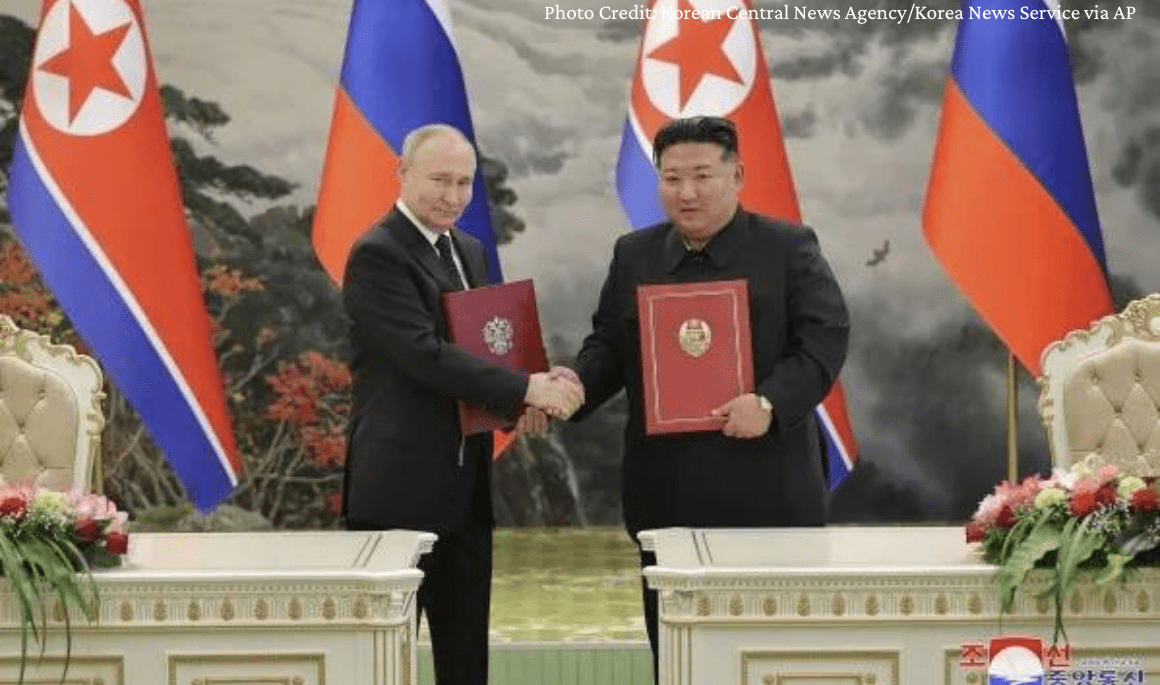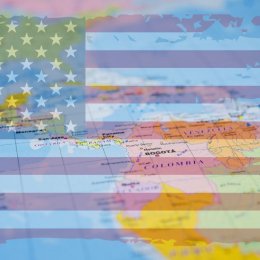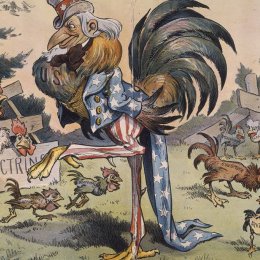- Norwich Blogs
- Blogs
- The U.S. Needs to Fully Realize the Strategic Significance of a New Russia-North Korea Pact
The U.S. Needs to Fully Realize the Strategic Significance of a New Russia-North Korea Pact
By Dr. Vitaly Kozyrev
This article discusses the implications of the evolving alliance between Russia and North Korea. The piece highlights that this pact is not merely a bilateral agreement but part of a broader strategic alignment involving Moscow, Beijing, and Pyongyang, united by a common interest in countering U.S. influence and reshaping the security architecture in Eurasia. The article argues that the United States must recognize the full extent of this alliance's strategic significance, as it could alter the balance of power in the region and challenge existing international norms. It emphasizes the need for the U.S. to adapt its foreign policy to address this emerging geopolitical reality effectively.

Disclaimer: These opinion pieces represent the authors’ personal views, and do not necessarily reflect the official policies or positions of Norwich University or PAWC.
On June 18-19, 2024, Russian President Vladimir Putin paid an unprecedented visit to North Korea (DPRK) and its Supreme Leader Kim Jong Un to revive the Soviet-era alliance. The DPRK has been heavily sanctioned by the international community for its nuclear arms and missiles program, which poses tremendous risks to the regional security order. Driven by the two countries’ resolve to fight the “hegemonic and imperialist” policies of the West and “establish global strategic stability and new just and equal international order,” the two leaders signed the “Treaty on Comprehensive Strategic Partnership between the DPRK and the Russian Federation,” which some observers referred to as Moscow’s “first defense alliance outside the post-Soviet space.”[1] The significance of this treaty goes far beyond just the revival of the mutual defense clause between the two signatory parties. It opens new formats of Russia-China-DPRK cooperation, reshuffles the power balance in the region, and also aims to challenge the U.S.-led integrated deterrence system untiringly formatted by the Biden Administration.
Indeed, Article 4 of the new treaty states that “in case any one of the two sides is put in a state of war by an armed invasion from an individual state or several states, the other side shall provide military and other assistance with all means in its possession without delay by Article 51 of the UN Charter and the laws of the DPRK and the Russian Federation.”[2] In addition, despite the existing international sanctions regime endorsed by the UN against North Korea, and formally supported by Russia as a UNSC permanent member-state, the two allies have formulated ambitious plans to deepen collaboration in the political, economic, defense, educational and cultural spheres. Russian President Putin describes the signing of the treaty as just a restoration of the original document signed by the USSR with DPRK in 1961, which contained the vital provision of mutual defense commitment. Putin explains that military assistance would be invoked in case of aggression by a third party, and “since South Korea does not seem to attack North Korea,” the treaty does not mean to threaten Seoul.[3]
The flow of comments in the press on the agreement indicates the significance of this event not only for the regional balance of power in East Asia but also for the world as a whole. Some experts assert that Russia took this unprecedented step due to its desperation in the context of the ongoing war with Ukraine, supported by the Western coalition on an ever-increasing scale. Since the previous Kim-Putin summit in the Russian Far East in September 2023, observers have characterized this tandem as a “global pariah summit,” pointing to the Russian leader’s “diminished status and growing international isolation.”[4] Although many analysts are divided on the question of whether it is a temporary marriage of convenience or an indicator of a deeper, long-term alliance, akin to the relationship between the two countries during the Cold War, the immediate implications of this new rapprochement between the two most-sanctioned regimes in the world have already resonated in the headquarters in the West and East. Officials in Seoul and Tokyo made their statements indicating that Moscow-Pyongyang rapprochement would undermine regional peace and stability, violate the UNSC sanctions regime, and worsen the regional security environment.[5] Korea’s Yoon Suk Yeol administration summoned the Russian ambassador to express its protest while promising to reconsider its position toward lethal arms supplies for the Ukrainian military forces.[6] The Biden administration expressed concern about the treaty, pointing to the fact that “the UNSC resolutions ought to be abided by.”[7] The idea of an Asian NATO has returned to the political discourse among the significant Asia-Pacific powers, and this new rapprochement between Moscow and Pyongyang has just made it more relevant. At the NATO Summit in Washington D.C. on July 9-11, the organization’s member states strongly condemned the “illicit military cooperation” between Russia and North Korea, which informs the expansion of cooperation between NATO and its Indo-Pacific Partners, namely, South Korea, Japan, Australia and New Zealand.[8]
On the face of it, the formalization of relations between the Kremlin and Kim Jong Un leaves an impression that Pyongyang now acts under the security umbrella provided by Moscow, which might give the Kremlin more opportunities to influence the geopolitical situation on the Korean Peninsula. In this case, the Kim regime would be able to reduce its dependence on China, which over the years has shown caution and concern about the North Korean nuclear program, which had long been a serious obstacle to ways to overcome mistrust between Beijing and Washington. The Western media has been spreading a popular narrative that the new rapprochement between Moscow and Pyongyang undermines China's position in the regional geopolitical game, pushes China aside, and even raises resentment in Beijing over speculation about the formation of a new alliance between China, Russia, and North Korea. Prominent Western experts assert that China’s “weak response” to the Putin-Kim pact shows that Beijing is “afraid of destabilization and uncontrollable escalation,” feeling “discomfort” and, being fearful of a new cold war, trying to avoid a three-way alliance which could further provoke the U.S., Japan, and South Korea to strengthen their own one.[9] Some South Korean strategists even stress that China would not benefit from a closer Russia-DPRK defense alignment since Beijing prioritizes “non-alignment” partnerships, and the triangular axis between Beijing, Moscow, and Pyongyang would complicate the already deteriorated China-U.S. relations, or even “damage China’s status in the international community.”[10] As former South Korean Minister of Foreign Affairs Yoon Young-kwan asserts, Beijing’s broader goal of undermining a U.S.-led unipolar international system informs China’s effort to re-engage South Korea and Japan back into its orbit. This Korean diplomat believes that China demonstrates “incongruity between China’s global strategy and those of Russia and North Korea,” which provides the U.S. the opportunity to maintain “diplomatic engagement with China and deterrence vis-à-vis Russia.”[11]
Interestingly, Beijing does not seek to debunk these narratives. There are voices heard in China’s officially sanctioned blogosphere that say the strengthening of the military-technical union of Russia and the DPRK is becoming a source of tension in the region, connecting the situation on the Korean Peninsula to the crisis in Eastern Europe, thus prompting the U.S. to contain further North Korea and complicating China’s position vis-à-vis the U.S. and its allies.[12] One Chinese expert, Jiang Fuwei, recommends the Chinese government refrain from speaking of the China-Russia-North Korea triangle and clarify the terms of the arrangement between China and DPRK, which is now tied by its new binding alliance with Russia. While setting the terms of engagement based on Beijing’s national interests and preventing China from “being exploited by the outside world,” the CPC, as Jiang argues, “needs to exert more influence on Russia, North Korea, South Korea, and even the United States to change the status quo and stabilize the situation.”[13] The Russian authorities also refrain from speaking of any newly built nuclear alliance between Russia, China, and North Korea, and, according to Russian Foreign Minister Sergey Lavrov, their nuclear arsenals “should be counted separately,” and the “only thing that unites these three countries is that they have been proclaimed the targets of the United States and their allies’ aggressive policy.”[14]
The reality is much different, though. The Russia-North Korea pact can be regarded as the result of a broader strategic agreement between Moscow, Beijing, and Pyongyang, which are united by the common idea of balancing against American hegemony and even sidelining the U.S., reducing the role of the American factor in the formation of a new joint security architecture in Eurasia. In his article published in Rodong Sinmun, a prominent Korean newspaper, before he visited Pyongyang, Putin emphasized that Moscow and North Korea would “develop mechanisms alternative to trade and mutual settlements that are not controlled by the West, and jointly resist illegitimate unilateral restrictions.” Specifically, the two parties pledged to “build an architecture of equal and indivisible security in Eurasia.”[15]
It is also noteworthy that Russia’s strategic re-engagement with North Korea has modified the very model of nuclear deterrence vis-à-vis the West. While possessing sufficient technical potential to deter the U.S. attack, the Kremlin has been lacking the psychological component of nuclear deterrence, which has significantly reduced Russia’s status as a credible nuclear threat to the West. Now, having a decisive and determinate DPRK ally, Russia has acquired a psychological component of deterrence, making its nuclear warnings more credible and simultaneously providing Pyongyang with the missing technological element of deterrence. This complementary deterrence mechanism leads to a significant shift in the power balance in the Asia-Pacific. It enables Moscow to utilize the new North Korea’s agency to counter the U.S. dominance and reshape the international order. Moscow considers the new treaty an effective response to U.S. plans to form an “Asian NATO.”[16] In addition, Putin positions Russia’s defense cooperation with Pyongyang, specifically the provision of nuclear and missile technologies to the Kim regime, as a response to U.S. supplies of long-range weapons to Ukrainian military forces, which are now allowed to strike on the Russian territory almost without any external constraints. The new weapons that might be supplied to North Korea, as Putin speculates, could be used by North Koreans at their discretion.[17]
In light of the Russia-Ukraine war, Moscow and Beijing have recently justified “special treatment” applicable to nuclear powers in the international system, pointing to the danger of any external interference to the neighboring areas adjacent to the nuclear states. In their May 2024 joint statement, both the Russian and Chinese leaders advocate for a special status for nuclear powers, which should refrain from infringing “on each other’s vital interests through the expansion of military alliances and coalitions and the creation of military bridgeheads close to the borders of other nuclear powers.”[18] This statement indicates that China supports the formation of spheres of influence of the major nuclear powers, and this matter should eventually become a subject of comprehensive security negotiations between them.
Beijing seems to have endorsed Putin’s new concept of the Eurasian security model as an alternative to the existing one based on U.S. guarantees. This concept is fully synchronized with China’s Global Security Initiative (GSI), proposed by Xi Jinping in 2023.[19] Still, it is oriented exclusively to the Eurasian actors – including the European ones in Western Eurasia and the Asian ones in the eastern part of the mega-continent. The Xi administration has apparently acknowledged the irreversible character of the China-U.S. confrontation. Hence, the existing narrative that China is the “biggest loser” in the context of a Russia-DPRK alliance is misleading. On the contrary, North Korea is acquiring a unique status that could facilitate all kinds of strategic collaboration between China and Russia in the areas that are too sensitive and tightly controlled by the Western powers. As one famous Russian military analyst, Vladislav Shurigin, asserts, the DPRK is acquiring the international status of a unique “platform” where the “enemies of China, Russia, and the DPRK are not allowed to enter, but which allows these three countries to conduct any operations in a full-fledged manner.”[20] Pyongyang might become a ‘dark chamber,’ as Shurigin puts it, since Beijing, being fearful of the secondary sanctions from the West, cannot support Russia or North Korea openly. Thus, many new opportunities arise for Moscow to use the gray zone of its economic cooperation with Pyongyang to develop the alliance and integrate the possible potential of North Korea into the China-DPRK-Russia-Iran-Belarus production chains.
In sum, this strategic re-alignment between Russia and North Korea is not an ad hoc response to U.S. policies; it is the beginning of a long game aimed at the eventual nullification of Washington’s ‘extended deterrence’ efforts. Russia’s new security initiative creates incentives for regional actors to reconsider their staunch commitment to strengthen ties with the U.S. and be involved in a conflict with China or Russia, now enhanced by the “unpredictable” North Korea. The reality is that, in the context of Eurasian security, Beijing recognizes the importance of Pyongyang's agency in the game of confronting the West. The Putin-Xi masterplan to alternate the U.S.-centered alliance system with their universal Eurasian security architecture might sideline the U.S. in the process of regional engagement, especially if China/Russia demonstrate their ability to improve defensive capabilities and productive synergy and show their readiness to strike deals with other regional actors, especially in the Global South.
Dr. Vitaly Kozyrev is a Distinguished Professor of Political Science and International Studies at Endicott College in Beverly, MA, and an Associate in research at the Fairbank Center for Chinese Studies at Harvard University. His recent and forthcoming publications include the monograph study The New Cold War at Sea: Maritime Implications of the China-Russia Quasi-Alliance (co-authored with Lyle Goldstein, U.S. Naval Institute Press, expected in 2025) and chapters in the following books: Russia-DPRK Relations in the 21st Century (Routledge, forthcoming in October 2024), Europe in an Era of US-Chine Strategic Rivalry (Global Power Shift Series. Springer, Cham., 2024), Rekindling the Strong State in Russia and China: Domestic Dynamics and Foreign Policy Projections (Leiden: Brill Publishers, 2020), East Asia: Increasing but Informal Integration (Routledge, 2014), The Chinese Labyrinth: Exploring China’s Model of Development (Roman and Littlefield-Lexington, 2011), China’s Energy Strategy: The Impact on Beijing’s Maritime Policies (Naval Academy Press, 2009), Normalization of U.S.-China Relations: An International History (Harvard University Press, 2006).
[1] Cha Du Hyeogn, “New North Korea-Russia pact calls for immediate military aid if invaded,” The Strait Times, June 20, 2024, https://en.asaninst.org/contents/the-straits-times-new-north-korea-russia-pact-calls-for-immediate-military-aid-if-invaded/
[2] “DPRK-Russia Treaty on Comprehensive Strategic Partnership,” Korea Central News Agency, June 19, 2024, http://www.kcna.kp/en/article/q/848b072d48dcc965d89ce5f716e78e71.kcmsf
[3] “Press-Conference for Russian Journalists at the Completion of Vladimir Putin’s State Visit to Vietnam,” Hanoi, June 20, 2024, Official Website of the President of the Russian Federation, http://www.kremlin.ru/events/president/transcripts/74357
[4] Peter Dickinson, “Putin’s North Korean “Pariah Summit” Underlines His International Isolation,” Atlantic Council, September 14, 2023, https://www.atlanticcouncil.org/blogs/ukrainealert/putins-north-korean-pariah-summit-underlines-his-international-isolation/
[5] Song Jung-a and Kana Inagaki, “Japan and South Korea Sound Alarm over Putin-Kim Military Pact,” Financial Times, June 20, 2024, https://www.ft.com/content/f79bf945-0ad6-4a99-96e1-588a026475f4
[6] Sue Mi Terry, “The Significance of the Putin-Kim Summit,” Council on Foreign Relations Blog Post, June 17, 2024, https://www.cfr.org/blog/significance-putin-kim-summit
[7] “On-the-Record Press Gaggle by White House National Security Communications Advisor John Kirby,” The White House Briefing Room, June 20, 2024, https://www.whitehouse.gov/briefing-room/press-briefings/2024/06/20/on-the-record-press-gaggle-by-white-house-national-security-communications-advisor-john-kirby-15/
[8] Jenny Town, “Yoon’s Clap Back to the Putin-Kim Summit,” Stimson Center Commentary, July 12, 2024, https://www.stimson.org/2024/yoons-clap-back-to-the-putin-kim-summit/
[9] Didi Tang and Ken Moritsugu, “Russia-North Korea Pact Could Dent China’s Influence, but Beijing Still Holds Sway over Both,” AP News, June 21, 2024, https://apnews.com/article/china-north-korea-russia-defense-agreement-3998a978ed89fd42b6da654ab1572873
[10] Lee Dong Gyu and Kim Jee Yeon, “China’s Position on Increasing Military Cooperation between North Korea and Russia,” The ASAN Institute of Policy Studies Issue Brief, January 4, 2024, https://en.asaninst.org/contents/chinas-position-on-increasing-military-cooperation-between-north-korea-and-russia/
[11] Yoon Young-kwan, “What to Make of the New Russia-N Korea Alliance,” The ASAN Institute for Policy Studies, July 12, 2024, https://en.asaninst.org/contents/gulf-times-what-to-make-of-the-new-russia-n-korea-alliance-2/
[12] “What Impact Will the Closer Relationship between North Korea and Russia Have on China?” (朝俄关系走近,对中国有何影响), Baijiahao Blog, January 19, 2024, https://baijiahao.baidu.com/s?id=1788498560043824409 ; “What Impact Will the Strengthening of Military Cooperation between Russia and North Korea Have on the Situation on the Peninsula?” (俄朝加强军事合作,将对半岛局势产生什么影响?), Phoenix Satellite Television (凤凰观察 – 凤凰卫视), February 1, 2024, https://baijiahao.baidu.com/s?id=1789665905258846020
[13] Jiang Fuwei [蒋福伟], “Putin Signed the Russia-North Korea Alliance Treaty. Is the China-Russia-North Korea Triangle Accelerating its Formation? China Has Only One Criterion to It,” [普京签下俄朝盟约,中俄朝大三角加速成形?中国的准则只有一条], Baijiahao Blog, June 23, 2024, https://baijiahao.baidu.com/s?id=1802623360181244242
[14] "Russia: Russia, China, North Korea Not in Nuclear Alliance – Lavrov,” Thai News Service, June 13, 2024, https://advance-lexis-com.proxy18.noblenet.org/api/document?collection=news&id=urn:contentItem:6C7M-T6W1-JB5P-J01J-00000-00&context=1516831.
[15] “Article by Vladimir Putin in the Rodong Sinmun Newspaper “Russia and the DPRK: Traditions of Friendship and Cooperation Through the Years,” The Official Website of the President of the Russian Federation, June 18, 2024, http://www.kremlin.ru/events/president/transcripts/74317
[16] “Russia: Expert Views Russia-North Korea Treaty as Counter to US Plans for Asian NATO,” Thai News Service, June 20, 2024, https://advance-lexis-com.proxy18.noblenet.org/api/document?collection=news&id=urn:contentItem:6C94-T611-DXMS-8418-00000-00&context=1516831
[17] “Press-Conference for Russian Journalists at the Completion of Vladimir Putin’s State Visit to Vietnam,” Hanoi, June 20, 2024, Official Website of the President of the Russian Federation, http://www.kremlin.ru/events/president/transcripts/74357
[18] “Joint Statement of the Russian Federation and the People's Republic of China on Deepening Relations of Comprehensive Partnership and Strategic Interaction, Entering a New Era, in the Context of the 75th Anniversary of the Establishment of Diplomatic Relations between the Two Countries,” Official Website of the President of the Russian Federation, May 16, 2024, http://www.kremlin.ru/supplement/6132
[19] “The Global Security Initiative Concept Paper,” February 21, 2023, Ministry of Foreign Affairs of the People’s Republic of China, https://www.fmprc.gov.cn/mfa_eng/wjbxw/202302/t20230221_11028348.html
[20] Ruslan Dmitriev, “Korea’s ‘Dark Chamber’: How the Treaty with the DPRK Will Help China and Russia” (Корейская «темная комната». Как договор с КНДР поможет Китаю и России), AiF (Arguments & Facts) Online, June 20, 2024, https://aif.ru/politics/world/koreyskaya-temnaya-komnata-kak-dogovor-s-kndr-pomozhet-kitayu-i-rossii



